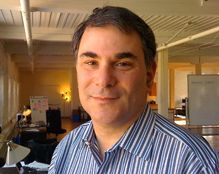 John Hagel speaks with satisfying precision. He has kind eyes and stern glasses, which together dominate the screen during a Sunday-afternoon Skype conversation.
John Hagel speaks with satisfying precision. He has kind eyes and stern glasses, which together dominate the screen during a Sunday-afternoon Skype conversation.
As co-chairman of Deloitte’s Center for the Edge, Hagel hunts for unexploited capability on the “edges” of business and makes the case to include them on the CEO’s agenda. “The edges are most fertile areas for innovation,” he says. They are an important place to watch, because what happens at the edges transforms the core.
Hagel’s research encompasses geographic edges (overseas economies), demographic edges (younger generations entering the workforce, their unmet needs), and the edges of technological discovery. If there’s anything his work has taught him, it’s that the manual is less of an asset than the “ability to respond to unexpected events.”
Hagel believes that we are approaching fundamental revaluation of the role corporations play in our lives.
Corporations in the first half of the 20th century were built around what Hagel calls the “push” business model. The greatest asset of these vertically integrated, gargantuan structures was their knowledge stock — aggressively protected trade facts and formulas that allowed them to forecast with reasonable accuracy which direction to “push” operations.
However, this push model is failing in the face of expanding digital technology infrastructures, Hagel claims. Reinforced by long-term policy shifts toward economic liberalization, barriers to market entry have been significantly reduced on a global scale. The pace of our transactions has increased, the lifespan of knowledge stocks has decreased and competitive intensity in the US economy has doubled in the last 40 years. Hagel calls this “the dark side of technology” — a counter-narrative to the Silicon Valley script of dazzling possibility.
But Hagel sees an antidote to this volatility: openness. “People are realizing that they need to collaborate to survive,” he says, “You have to give up your secrets, your competitive advantage. It’s the only sustainable edge.” Hagel calls this new order the world of “pull,” and he describes it in his book, The Power of Pull: How Small Moves, Smartly Made, Can Set Big Things in Motion.
“Pull,” a splendidly iconoclastic antidote to traditional American corporate culture, means moving away from hub-and-spoke networks where knowledge was selfishly guarded to mesh networks that favor collaboration. Pull rejects claims to have all the right answers and instead favors asking smart questions.
“When people come at you with a façade as if everything’s under control, it does not generate trust,” Hagel says. “Admitting you don’t know something is a prerequisite to making progress.”
Rather than showing strength, influence in an uncertain economy paradoxically comes from expressing vulnerability. Yet Hagel says he had to learn the value of vulnerability. As a boy, he was often subject to his mother’s hostile temper.
“The key lesson that I took from my childhood was that my needs did not matter,” he explains. Upon his entry into management consulting, Hagel readily embraced the maxim that the client’s needs had to come first. “For the first part of my career, I was a servant of others,” he says. “The idea that others could help me was completely foreign to me.”
Hagel attributes the shift in his thinking to a talk he gave at the Collaborative Innovation Summit hosted annually by the nonprofit Business Innovation Factory (BIF) in Providence, RI.
“Saul Kaplan invited me to be a storyteller at BIF6, and I’ve talked a lot and in various conferences and settings, and that seemed perfectly fine,” Hagel says. “But then he said, ‘We want you to talk about a personal experience and what you’ve learned from it,’ — and that was very scary.”
“Stories are not my thing. I am a person of reason and analysis,” began Hagel’s BIF6 story. But sure enough, he shared two tales of formative childhood experiences in a passionate expression of his business philosophy that later became the story of that year’s Summit. “It was the first time I ever got on stage and talked about myself,” he reflected in hindsight.
The experience was an incredible catalyst. “It really unleashed a tremendous sense of potential and possibility, that by sharing my personal experiences, by talking about things I didn’t know, and I connected with people in a way that I would never have had I just given my standard speech. I can’t wait to be a storyteller at BIF10 in September.”
“The key lesson I got from the BIF Collaborative Innovation Summit,” Hagel says, “is that innovation is ultimately not about ideas, it is about personal connection.”
This is the first of a 10-article series originally published on the Time website, authored by myself and Nicha Ratana, of conversations with transformational leaders who will be storytellers at the BIF10 Collaborative Innovation Summit in Providence, RI, on Sept. 17-18.









Leave a Reply